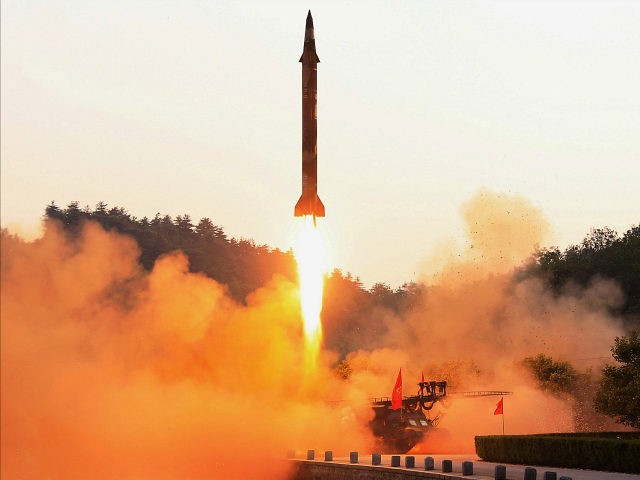North Korea’s ability to acquire banned technology in defiance of sanctions has long been recognized as a serious problem, but according to a new report from the International Institute for Strategic Studies (IISS), the “astounding progress” in North Korean missile technology over the past two years is largely based on Russian rocket engine technology.
The IISS report notes that no other country has ever advanced from medium-range missiles to ICBMs as quickly as North Korea, which fumbled around with a number of failed designs before suddenly producing the alarmingly capable Hwasong-12 and Hwasong-14 platforms. Most remarkable was the elapsed time between testing the advanced medium-range Hwasong-12 and Pyongyang’s first real multi-stage intercontinental ballistic missile, the Hwasong-14: about two months.
The big difference between these weapons and the sad, low-energy Musudan missile is a liquid-fueled engine that suspiciously resembles the Soviet-era RD-250. The IISS report introduces a great deal of evidence to support the notion that North Korea purchased these engines from Russian or Ukrainian sources on the black market. Conversely, there is very little evidence suggesting North Korea developed its liquid-fueled engines indigenously.
The author of the report, IISS Senior Fellow Michael Elleman, gets even more specific about the source of the rocket engines: he matches their performance to engines produced by particular factories in Russia and Ukraine, notes that North Korea has firm ties to black-market suppliers in both countries, and points out the Yuzhnoye facilities in Ukraine are very close to the battlefront between government forces and Russia-backed separatists.
Elleman reasons that the sudden abandonment of the Musudan missile in the fall of 2016, at roughly the same time economic turbulence struck Ukraine, spotlights the moment when Pyongyang could have bought a few rocket engines from disgruntled factory employees. He stresses that the Ukrainian government probably was not involved in the transaction and neither were executives of the Yuzhnoye company; it was more likely a matter of workers falling upon hard times and being exploited by “unscrupulous traders, arms dealers and transnational criminals operating in Russia, Ukraine and elsewhere.”
A disturbing final report in the IISS report notes that adapting these Russian liquid-fueled engines to power the second stage of an ICBM will take some time, but once North Korea perfects such a design, it will have missiles that can target the entire U.S. mainland. Elleman suggests enlisting China and Russia to enforce a tough ban on missile testing that would prevent North Korea from taking that final step to global nuclear blackmail.
That is an interesting recommendation in light of the Trump administration’s “strategic accountability” policy rollout, which is ostensibly concerned with the seemingly impossible task of pressuring North Korea to drop its nuclear missile program entirely. In reality, sending unmistakable signals to Pyongyang and Beijing that nuclear blackmail will not be tolerated seems like a more realistic objective. Preventing North Korea from perfecting the technology for multi-stage ICBMs with nearly unlimited range could be another.
North Korea appears to have backed down from threats to attack Guam. China is still protecting Pyongyang’s interests but has been willing to get tougher with North Korea than ever before. China will want to lay out an exit scenario for the hard sanctions voted into place by the U.N. Security Council. Scuttling North Korean plans to improve its ICBMs further might be more achievable than a complete disarmament program, especially since China continues to insist that ending U.S.-South Korean military cooperation is the price for entertaining disarmament proposals. Freezing the Hwasong line at Model 14 seems like it could be a compromise objective.
The United States conducted joint air maneuvers with Japan off the Korean coast on Wednesday, with a special guest appearance by the dazzling B-1B bombers that North Korea hates so much that it threatened to launch missiles at their air base on Guam. Contrary to mainstream media illusions, North Korea finds the B-1B much more offensive than anything President Donald Trump has said.
These exercises are a direct rebuke of North Korea’s incessant demands to halt South Korean and Japanese drills with the United States in general, and B-1B bomber flights in particular. Before negotiations can begin, all parties must show they have cards to play and chips to put on the table. North Korea’s access to powerful rocket engines must be a chip Pyongyang, Beijing, and Moscow are prepared to ante up. Surely authoritarian nations like China and Russia can shut down black-market shipping lines to a little rogue nation like North Korea if they want to.

COMMENTS
Please let us know if you're having issues with commenting.